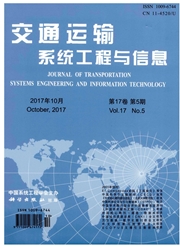

 中文摘要:
中文摘要:
出行个体每日的路径选择,不仅与路径的感知出行时间有关,还受到出行个体自身偏好、习惯等因素的影响.本文基于Dogit模型,在传统的日常路径选择模型中加入路径偏好动态更新规则,并给出三种感知出行时间学习模式,对比分析了个体路径偏好对日常路径流量演化轨迹的影响.算例结果表明,与静态Dogit模型相比,Logit模型会因忽略个体路径偏好而高估路径之间的差异性,且总是会高估"优势"路径的流量,低估"劣势"路径的流量.当个体路径偏好动态更新时,其均衡流量结果介于Logit模型和初始参数相同的静态Dogit模型之间.
 英文摘要:
英文摘要:
Individuals' daily route choice results, is not only related to the perceived route travel time, but also the individuals' personal preference, travel inertia and other factors. In this paper, a dynamic-updating mechanism for route preference based on Dogit model is introduced into the traditional day-to-day route choice model. Three different learning strategies on perceived route travel time are proposed, and the effects of individual route preference on day-to-day route flow evolution track are analyzed and compared. The numerical results show that, in contrast with the static Dogit model, the Logit model always overestimates the route difference owing to ignoring individuals' route preference, to be specific, always overestimates the traffic flow on dominant routes and underestimates the traffic flow on inferior routes. When the individuals' route preference is dynamically updated, the equilibrium flow always stays between that under Logit model and static Dogit model with same initial parameters.
 同期刊论文项目
同期刊论文项目
 同项目期刊论文
同项目期刊论文
 期刊信息
期刊信息
